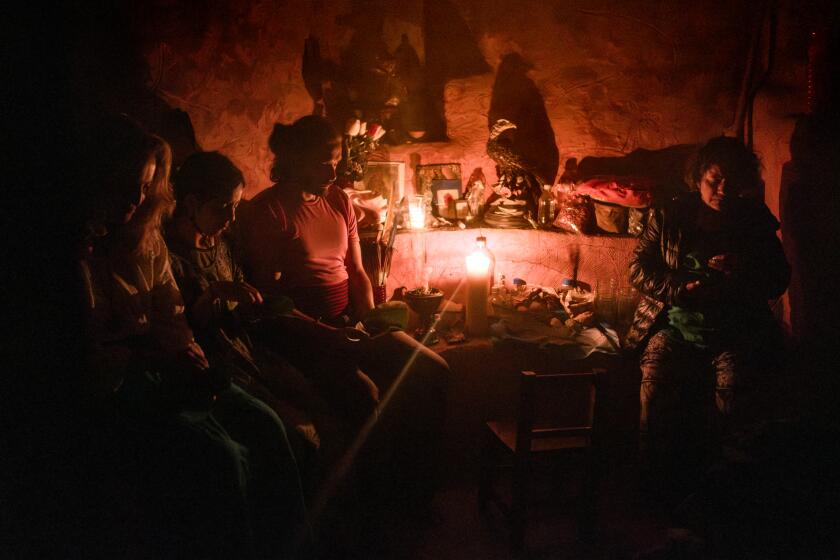Jury Weighing Life or Death Sentence for Sniper Malvo
The jury that last week convicted Lee Boyd Malvo of murder began deliberations Monday to decide whether the teenage sniper who terrorized the Washington, D.C.-area should be sentenced to death or life in prison without parole.
To impose the death penalty, the eight women and four men on the jury under Virginia law must find that Malvo’s crimes were particularly vile and heinous, or that he poses a future threat to society. The prosecution, in asking jurors to return “the ultimate penalty,” referred to Malvo as a “sinister life-taker” with a “depraved mind” and no sense of remorse.
Malvo, 18, was part of a two-man sniper team that killed 10 people and wounded three others during a three-week rampage in October 2002 in Washington, suburban Virginia and Maryland. The victims were chosen at random and shot while engaged in routine daily activities: One was mowing a lawn, another was sitting on a park bench, a third was putting goods into her car in a Home Depot parking lot.
John Allen Muhammad, 42, Malvo’s co-conspirator, was convicted in a trial last month in Virginia Beach, Va. The jury recommended he be executed, which in Virginia is carried out by electrocution or lethal injection. Virginia has executed 89 murderers since 1982, more than any state except Texas.
In a closing statement Monday, prosecutor Robert Horan said that what he wanted Malvo’s jury to deliver was justice, not revenge. As he spoke, pictures of the sniping victims -- some alive and smiling, others bloodied and sprawled at the site where they were killed-- flashed across a screen; the jurors heard the soft, edgy voice of Malvo describing each killing to investigators in a taped confession.
Malvo sat slumped in his chair, head bowed. For most of the 26-day trial, the boyish-looking, 5-foot-3 defendant has shown little emotion, not flinching Friday when Myrtha Cinada, the daughter of one victim, turned toward him from her seat in the witness box and shouted, “Malvo, you are evil! You are insane because you took my father’s life.”
Craig Cooley, Malvo’s court-appointed attorney, based his defense on mitigation: that Malvo was the product of a troubled, unstable childhood in Jamaica but had been an obedient, decent youth until, in his search for a father figure, he fell under the spell of Muhammad -- an Army veteran who wanted to destroy white American society because of racial injustices.
“Children are not born evil,” Cooley said Monday in support of his claim that Muhammad had brainwashed Malvo into becoming a child soldier. “When they commit evil acts, you can almost always trace the acts to the evil that has been performed against them.”
Pleading for Malvo’s life, he asked the jurors not to be swayed by “the voices of revenge and retribution.” Cooley walked from the jury box to the witness stand, put his hand gently on Malvo’s shoulder and said, “Please, exercise compassion.” Malvo, chin resting in the palm of his right hand, did not move or look at Cooley.
The 12 jurors eventually seated for Malvo’s trial had said during the selection process that they could impose a death sentence if the crime were heinous enough. At least one expressed reservations, saying, “I’m not opposed to it, but I wouldn’t want to be a party to it.”
Nationally, juries have grown increasingly reluctant to impose death penalties on juvenile offenders -- Malvo was 17 at the time of the sniper attacks -- and Amnesty International says the practice has been mostly abandoned throughout the world. It reports the only known countries to execute juvenile offenders since 1990 are the United States, China, Nigeria, Yemen, Iran, Pakistan and Congo.
“Certainly Malvo’s age will be an important factor in the jury deliberations,” said Stephen Harper, a Miami public defender who teaches juvenile law at the University of Miami. “The defense presented a huge number of mitigating factors, and some of them are exasperated by the vulnerability of youth.”
Since 1985, the United States has executed 22 murderers who committed crimes as juveniles. In a U.S. death row population of 3,500, 75 are juvenile offenders. All are males. Their time on death row ranges from a few weeks to 23 years.
Malvo, who pleaded not guilty by reason of insanity, faces three charges, each of which are punishable by death: the fatal sniper attack on Linda Franklin, 42, an FBI analyst, in October 2002; the murder of more than one person in a three-year period; and committing a crime in an attempt to intimidate the public and influence the government, a provision of Virginia’s new terrorism law.
More to Read
Sign up for Essential California
The most important California stories and recommendations in your inbox every morning.
You may occasionally receive promotional content from the Los Angeles Times.










